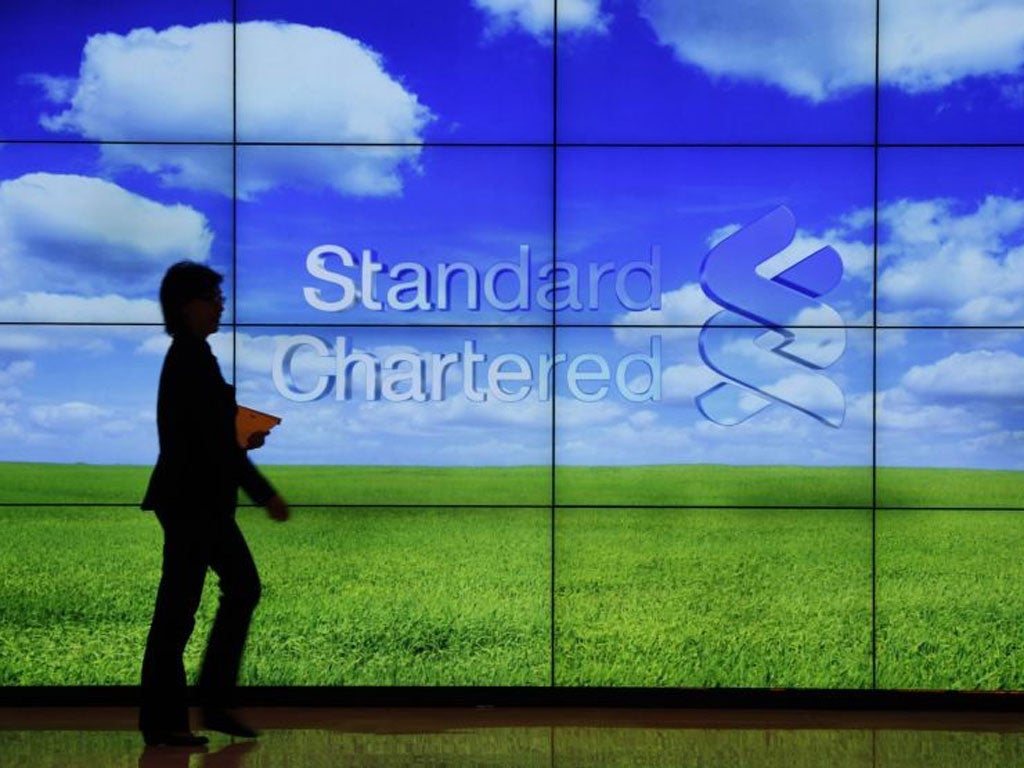British bank 'laundered $250bn for Iran regime'

Standard Chartered, one of Britain's most distinguished global banks, has been accused by US regulators of laundering $250bn from Iran and behaving like a "rogue institution", in the latest catastrophic blow to the international reputation of the City of London.
In an explosive legal order last night, New York state's Department of Financial Services accused the New York branch of the 160-year-old institution of leaving the US financial system "vulnerable to terrorists, weapons dealers, drug kingpins and corrupt regimes" through its "flagrantly deceptive actions" between 2001 and 2010.
The regulator said that the branch of the UK-based bank had earned millions of dollars in fees by "conspiring" with the pariah Gulf state in around 60,000 "secret transactions".
This behaviour, according to the regulator, had been purely "motivated by greed" on the part of Standard Chartered. The regulator also said it had uncovered evidence of similar schemes by Standard Chartered to conduct business with Libya, Burma and Sudan, all of which have been subject to sanctions by the US.
The bank has been threatened with having its US banking licence revoked and has been ordered to appear before the regulator soon to explain these apparent violations. The accusations are the latest blow to the reputation of the British banking sector. In July, a United States Senate panel found that HSBC was used by Iranians looking to evade sanctions and by Mexican drug cartels.
And in June, Barclays was fined £290m by UK and US regulators after the bank admitted that it had manipulated the Libor interest rate, which is used to set the prices of trillions of dollars worth of loans around the world, to inflate the bonuses of traders in its investment bank.
The latest accusations are a potential disaster for Standard Chartered which was, until now, the only global UK bank which emerged from the 2008 financial crisis with is reputation for financial prudence intact.
Standard Chartered's chief executive, Peter Sands, has been one of the most vocal opponents of new regulations that have been advanced in recent years to curb the excesses of the financial sector. Mr Sands had even been promoted in some quarters as a possible replacement for Sir Mervyn King as Governor of the Bank of England.
But the New York regulator said yesterday that the wrongdoing was sanctioned by Standard Chartered's "most senior management". It reported that one senior director, when warned of the US sanctions, had said: "You f***ing Americans. Who are you to tell us, the rest of the world, that we're not going to deal with Iranians?"
The regulator laid out allegations of how Standard Chartered had systematically falsified business records, obstructed regulators and failed to record transactions.
In response to the allegations, the bank said that it was conducting a review of its historical US sanctions compliance which it was discussing with US enforcement agencies and regulators. It said in a statement: "The group cannot predict when this review and these discussions will be completed or what the outcome will be."
The New York regulator also said that Standard Chartered's accountants, Deloitte & Touche, "apparently aided" the bank's "deception" in relation to the money laundering. The regulator said that Standard Chartered moved money into the US on behalf of clients including the central bank of Iran and the state-owned Bank Saderat and Bank Melli.
The nine-month inquiry, led by Benjamin Lawsky, the Superintendent of the New York Department of Financial Services, involved looking through more than 30,000 pages of documents, including internal Standard Chartered emails.
Senior management at the bank are said to have codified their laundering procedures – known as "wire-stripping" – in formal operating manuals. According to the order, these "provided step-by-step wire stripping instructions for any payment messages containing information that would identify Iranian clients".
The US-dollar transactions in question originated and terminated in European banks in the UK and the Middle East, and were cleared through its New York branch.
The regulator's order was issued just before the close of the London stock market where Standard Chartered is listed.
The bank's share price fell by 6 per cent to 1470p leaving it valued at £35.7bn.
Born out of the empire: an Asian giant
Standard Chartered's roots lie in the fertile soil of the British Empire and the explosion of trade of the 19th century. The Scottish businessman and Liberal politician James Wilson was granted a banking charter by Queen Victoria in 1853. His Chartered Bank set up shop in Bombay, Calcutta and Singapore, where it financed the tea, indigo, sugar, and hemp trade between Britain and her colonies.
Meanwhile, the Standard Bank was established by a Scottish émigré, John Patterson, in 1862 in South Africa, where it furnished diamond and gold miners with loans.
The two banks were brought together in 1969. Today, despite being listed and headquartered in London – and being highly visible in the UK as a sponsor of Liverpool Football Club – Standard Chartered is primarily focused on Asia. It is one of the biggest foreign providers of credit to households and firms in China, and has 1,700 branches worldwide.
According to its most recent annual report, Standard Chartered's global operation generated revenues of $17.6bn and $5bn in profits in 2011.
Standard Bank and Standard Chartered’s relationship ended in 1987 when Standard Chartered sold its 39 per cent stake in Standard Bank. Standard Bank has since operated as a standalone operation and would like to stress the there is no longer a relationship between the two companies.
Subscribe to Independent Premium to bookmark this article
Want to bookmark your favourite articles and stories to read or reference later? Start your Independent Premium subscription today.

Join our commenting forum
Join thought-provoking conversations, follow other Independent readers and see their replies